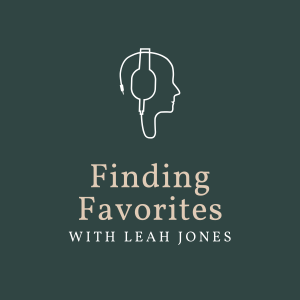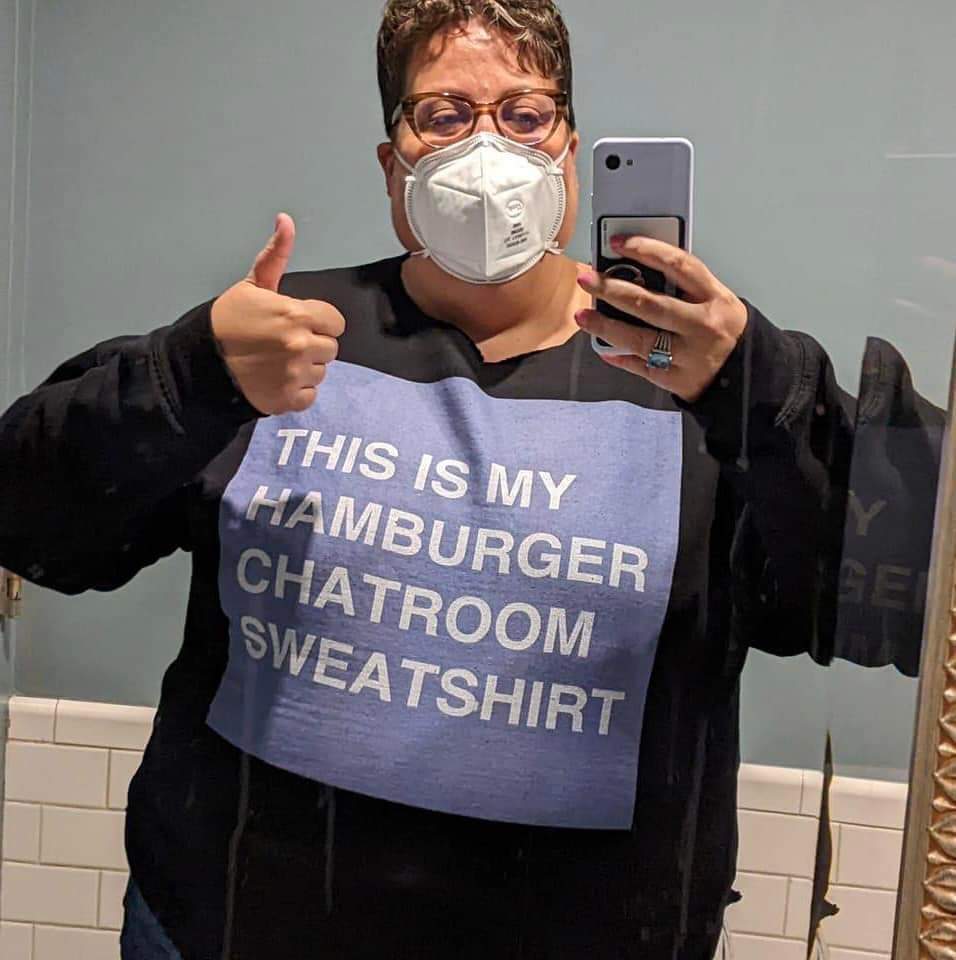Finding Favorites with Leah Jones
Finding Favorites is where we learn about people’s favorite things and get recommendations without using an algorithm. Every other week, host Leah Jones sits down with a guest to learn about how they found their favorite thing, why they love it and why they think other people will fall in love, too.
Episodes

Sunday Apr 03, 2022
Author Deborah Greenhut loves challah, Joni Mitchell and Laura Nyro.
Sunday Apr 03, 2022
Sunday Apr 03, 2022
Deborah Greenhut, author of The Hoarder's Wife, joined Leah on Finding Favorites to discuss her debut novel, baking challah, and the music of Joni Mitchell and Laura Nyro.
Deborah's debut novel is available on April 5, 2022, in print and digital.
DeborahGreenhut.com
The Hoarder's Wife
Woodhall Press
Children's travel books by Deborah
Gentle Art Swedish Death Cleaning
The Settlement Cookbook
Joni Mitchell's mysterious illness
Laura Nyro
Gershwin Plays Gershwin
Follow @findingfavspod on Instagram and Twitter. Rate and review on Apple Podcasts
Transcript follows

Sunday Mar 27, 2022
Katie Jones loves Reality TV (Guest Host Shai Korman)
Sunday Mar 27, 2022
Sunday Mar 27, 2022
Shai Korman, host of Friday Night Movie Podcast, joins the Finding Favorites team this week as guest host. He's talking to Katie Jones about her love of Reality TV.
Follow @findingfavspod on Instagram and Twitter. Rate and review on Apple Podcasts
Follow Shai AKA @pancake4table on Twitter and Instagram. Subscribe to Friday Night Movie Podcast

Sunday Mar 20, 2022
Cancer and Pop Culture Favorites
Sunday Mar 20, 2022
Sunday Mar 20, 2022
Host Leah Jones is the guest this week - talking about all of her favorite podcasts, TV shows, movies and other random stuff that kept her comfortable during primary cancer treatment. She rang the gong after her final radiation treatment on March 18, 2022, so this is a recap of just some of the stuff that she liked since her diagnosis.
Follow @findingfavspod on Instagram and Twitter. Rate and review on Apple Podcasts
Podcasts
Doughboys
HDTGM
Arm Cherries
Everything Nicole Byer - WWYDM, Best Friends, Newcomers
High mighty, Dork Forest
Blank Check with Griffin and David
Friday Night Movie Podcast and the Korman trio
The Bagel Report
Jackie and Laurie Show
Deep Dive - Jessica St Claire
My own podcasts - Candy Chat Chicago, Finding Favorites and guesting on podcasts
TV
Love is BLind season 2
The Circle season 2 (or was it 3?)
Chocolate School
Ghosts (CBS and BBC)
Murdoch Mysteries
Grand Crew
Minx - very excited
Movies
Steroid Saturdays - brunch, movie
Action - big budget movies
Dune x 2
Spiderman Homecoming
Jackass x 2
The King’s Man
Fast 9
Apps
Tik Tok
Match 3 games with generous infinite lives
Caring Bridge
Anticipating trips
The return (and rescheduled) live shows
Kyle Kinane at Thalia Hall
Hadestown and Frozen
Lyric Opera
HDTGM in LA
Doughboys in Boston, Chicago
Letter Kenny Live
Israel in July
Recommending Wallys on 1-55 in Pontiac
Random Cancer recommendations
Ice socks and ice mittens for neuropathy
A medical recliner for recovering from major surgery
Rock that Treatment gift boxes
Israeli Gift Box
A great dress - Fringe and Co
Grubhub, Amazon gift cards
Single serving food deliveries
Aquaphor
Cozy clothes - sunday sleeper pants from old navy
Being as private or public as you want
Making silly swag for my helpers
Accepting help (wheelchairs, garbage, meals)

Sunday Mar 13, 2022
Steve Higgins loves The Nightmare Before Christmas
Sunday Mar 13, 2022
Sunday Mar 13, 2022
Steve Higgins, an award-winning English professor at Lewis and Clark and your favorite poetry professor on Tik Tok, has loved The Nightmare Before Christmas for 30 years. We talk about merchandise, music and lessons for aliens in the Tim Burton classic.
Follow Steve on Twitter and Tik Tok where he does one minute poetry lessons.
Follow @findingfavspod on Instagram and Twitter. Rate and review on Apple Podcasts
Links
Peacemaker
Righteous Gemstones
Ghosts - CBS and BBC
Beforeigners
The Nightmare Before Christmas
Corpse Bride
Burger King Watches
Original Trailer
Sally's Song
How to light hanukkah candles
Donate to HIAS or JDC
Steve 0:00 Hello, my name is Steve Higgins. And my favorite thing is "Nightmare Before Christmas."
Transcript follows

Sunday Feb 27, 2022
Author Jayne Martin loves Paris
Sunday Feb 27, 2022
Sunday Feb 27, 2022
California-based author Jayne Martin's favorite place is Paris, France, and we settled in to talk about the bread, the Eiffel Tower and people watching. Jayne's newest book, The Daddy Chronicles, is available for pre-order and will launch on March 15, 2022.
Follow Jayne Martin online and pre-order The Daddy Chronicles
The Daddy Chronicles: Memoir of a fatherless daughter
Jayne Martin's website
Facebook
Twitter @Jayne_Martin
Instagram @jayne.martin.writer
Follow @findingfavspod on Instagram and Twitter. Rate and review on Apple Podcasts
Show Notes
Jennifer Weiner advice for writers
Tik Tok Horse Rescue
Meg Pokrass (flash fiction retreats)
Shakespeare and Company bookstore in Paris
Alelie filming locations
Picasso Museum in Paris
MBMBAM Amelie bit
Paris Pet Cemetary
Health benefits of cobblestone streets
Revolution and throwing cobblestones
Immaculate Conception in Italy
Kingston Trio sings MTA (Boston Song)

Monday Feb 21, 2022
TV gone Jewy with Esther Kustanowitz
Monday Feb 21, 2022
Monday Feb 21, 2022
Esther Kustanowitz, co-host of The Bagel Report, is back with another one of her favorite things - finding Jewish moments in pop culture! We talk about what representation meant to her as a kid and how it has changed over the last 15 years as Jewish moments on TV increase.
How TV has embraced dybbuks, golems and other Jewish lore
Twitter: @estherk @thebagelreport @tvgonejewy
IG: @estherkustanowitz @TBRthepod
FB: The Bagel Report TVGoneJewy
The Bagel Report podcast, available wherever you get your podcasts
Follow @findingfavspod on Instagram and Twitter. Rate and review on Apple Podcasts
Show Links
Limmud
Elevator episode was Facts of Life, not Different Strokes!
Milky Way LA
Stars of David
The Wonder Years revamped Bar Mitzvah
Better Things on FX
Part one of Esther K's interview on Friday Night Movie Podcast
Friday Night Movie Podcast part 2
The Bagel Report
History of confirmation in the Reform movement

Sunday Feb 13, 2022
Sarah M Anderson’s guide to Romance Books
Sunday Feb 13, 2022
Sunday Feb 13, 2022
Author Sarah M Anderson, who also writes as Maggie Chase and Sally Sultzman, joined Leah this week to share the story of how she became a prolific published author. With well over 40 romance books available, Sarah shares recommendations for all types of romance genres, YA romance and cozy mysteries.
Follow Sarah online
SarahMAnderson.com/
Twitter @sarahmanderson1
Twitter @SallySultzman
SallySultzman.com/
Maggie Chase on Amazon (very spicy)
Follow @findingfavspod on Instagram and Twitter. Rate and review on Apple Podcasts
Show Links
Most popular baby names of 1976
Bunnicula
GP Gottlieb (cozy mysteries with recipes)
The Cat Who Series
Jamie Loftus, Lolita Podcast
Harlequin
Romance Authors
https://www.crystalwrote.com/
https://www.oliviawaite.com/
https://oliviadade.com/
https://kjcharleswriter.com/
https://catsebastian.com/
https://www.meganframpton.com/
https://www.emeryleebooks.com/meet-cute-diary
https://www.byleahjohnson.com/
https://karenbooth.net/
https://twitter.com/_AdeleBuck
https://www.tashalharrison.com/ wrote the Say Yes duet
https://www.mandacollins.com/
Updates on Leah's CaringBridge

Sunday Feb 06, 2022
Jessica loves traveling the world
Sunday Feb 06, 2022
Sunday Feb 06, 2022
Jess, a Wisconsin-based world-traveler, loves... well, she loves travel! In this episode, Jessica shares her story of how two week vacations turned into a three month trip and set the stage for her to travel abroad for one year and eight months. COVID may have brought her back to the States early, but it hasn't dampened her desire to share how to make long trips work.
Follow Jessica, aka @bayjb, on Instagram
Show Links
The Professional Hobo
How much does it cost to travel around the world?
Budget travel around the world
Trail Wallet
Countries and locations
https://en.wikipedia.org/wiki/Myanmar
https://en.wikipedia.org/wiki/South_Africa
https://en.wikipedia.org/wiki/Tanzania
https://en.wikipedia.org/wiki/Tasmania
https://en.wikipedia.org/wiki/New_Zealand
https://en.wikipedia.org/wiki/Taj_Mahal
https://en.wikipedia.org/wiki/Zanzibar
https://en.wikipedia.org/wiki/Vietnam
https://en.wikipedia.org/wiki/Australia
https://en.wikipedia.org/wiki/China
https://en.wikipedia.org/wiki/Taiwan
https://en.wikipedia.org/wiki/Uluru
https://en.wikipedia.org/wiki/The_Bund
https://en.wikipedia.org/wiki/South_Korea
https://en.wikipedia.org/wiki/Japan
No intro this week, because Leah is in Boston celebrating the end of chemotherapy and enjoying a break before radiation starts.
Follow @findingfavspod on Instagram and Twitter. Rate and review on Apple Podcasts
Updates on Leah's CaringBridge

Sunday Jan 30, 2022
Adal Rifai loves Chicago restaurants (guest host Shai Korman)
Sunday Jan 30, 2022
Sunday Jan 30, 2022
Adal Rifai, a legendary Chicago-based podcaster, loves Chicago restaurants and joined guest host Shai Korman to give recommendations. Adal is Chunt on Hello from the Magic Tavern, hosts Hey Riddle Riddle and Siblings Peculiar. Shai is joining us from the Friday Night Movie Podcast.
Follow Adal Rifai online
Hello from the Magic Tavern
Instagram @adalrifai
Twitter @adalrifai
Chicago Food Tour
Percolator
June Bug
Galit
Au cheval burger
Community on Milwaukee
Chicago Diner
Taste Of Lebanon
JP Grazianos
Alinia
Girl and the Goat
Follow @findingfavspod on Instagram and Twitter. Rate and review on Apple Podcasts
Updates on Leah's CaringBridge

Sunday Jan 23, 2022
Filmmaker Erika Valenciana with guest host Amy Güth
Sunday Jan 23, 2022
Sunday Jan 23, 2022
Erika Valenciana, a Chicago-based filmmaker, loves making her own clothes. She joins guest host Amy Güth to talk about documentary films, sewing and more. Catch up with Erika in Mexico City in March for the premier of her documentary La Mitad del Mundo!
Follow Erika on Instagram and online with Diverse Voices in Docs, Stowe Story Labs. Erika and Magdelena Hernandez "La Mitad del Mundo" documentary film is going to premiere at Lit Luz in March
Amy is the host of Unconventional with Amy Güth and Crain's Daily Gist. She also produces cultural events at 5959 in Chicago. Follow Amy on Instagram for yoga writing prompts and subscribe to her weekly email newsletter.
Show Notes
"Brewer" and "Birder By The Lake" are both not yet available online, both are in-progress
Anu Rana, producer of "Brewer" film
Mitch Wenkus, cinematographer of "Birder by the Lake" film
Professor Valerie Frizzle, PhD
Threadbare
TV Host wears same suit
Barack Obama wore the same tuxedo for 8 years, nobody noticed
Successful people wear the same clothes every day
Follow @findingfavspod on Instagram and Twitter. Rate and review on Apple Podcasts
Updates on Leah's CaringBridge

Finding Favorites with Leah Jones
Everyone loves something. A hobby, a musician, an artist, a book genre - everyone has a favorite thing and this is the podcast where we hear the stories.
How did you discover your favorite thing? What do you love about it? Who have you met through it? How would someone sample your favorite thing?
At Finding Favorites, we get recommendations without using an algorithm.
Hosted by Leah Jones










